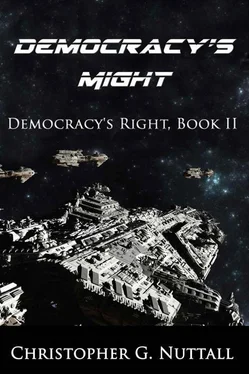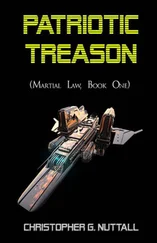Christopher G. Nuttall
DEMOCRACY’S MIGHT
Democracy’s Might is Book II of The Democracy Series , following Democracy’s Right . It will probably be completely incomprehensible to someone without reading Democracy’s Right first. Fortunately, Democracy’s Right is available on Kindle; a free sample can be downloaded from my website.
It is my intention to write Book III in March or April 2014.
If you like this book, please review it on Amazon and join my facebook page or mailing list.
Thank you for your time.
Christopher Nuttall
“Transit complete, sir.”
Captain Saku Rautiainen sucked in his breath as Jupiter appeared on the viewscreen. Easily one of the largest gas giants known to mankind, it dominated the Sol System, the Great Red Spot blazing out in the interstellar darkness. Hundreds of installations orbited the gas giant, ranging from large industrial nodes and cloudscoops to a giant Class-III shipyard. Jupiter had powered humanity’s expansion into the galaxy ever since the human race had first started to reach into space. Its shipyards produced a tenth of all new human starships.
It was an impressive sight, Saku decided. Even knowing that most of the installations were owned by the Cicero Family, even knowing that they contributed mightily to humanity’s bondage, they were still impressive. He took one last look, then glanced down at his display, checking that the IFF codes had been accepted by the defences. If the Geeks had failed, the whole operation was about to come to a short and violent end.
“They accepted our codes,” Martin McKenzie said. “Don’t they know there’s a war on?”
Saku smirked. It had been seven months since the first mutiny, six months since word had finally been sent to Earth — and barely a week since it had arrived at the heart of the Empire. There were so many defences in orbit around Earth and the other planets in the Sol System that attack seemed inconceivable. Earth hadn’t been directly threatened for thousands of years, unless one counted the Empress’s suborning of Home Fleet. The mutinies had taken place thousands of light years away. It was unlikely that the defenders of Earth realised that they might be attacked within days of word reaching the planet.
“I don’t think they’ve realised it yet,” he said. “Take us in.”
He glanced over at his old friend and smiled. McKenzie had worked for one of the big shipping lines before suffering an accident that had damaged his legs, leaving him permanently stuck in a mover. The shipping line might have abandoned him, but he’d somehow managed to find work on an independent freighter, work that had eventually led him to the underground. He’d volunteered for the mission as soon as he’d heard about it, despite the near-certainty that they wouldn’t escape. Like Saku, McKenzie had scores to pay off.
The defences did nothing as the giant freighter inched closer and closer to the heart of the complex, the giant Class-III shipyard. There were only three such shipyards in the Empire, the only ones authorised to design and build superdreadnaughts. Not that the Empire had done much of that in the last two hundred years. The Empire’s monopoly on superdreadnaughts — and possession of the biggest hammer in the galaxy — had allowed the designers to slow down and stop trying to improve their work. Somehow, Saku had a feeling that they were going to regret it.
He smiled to himself. The Empire was stagnant; the Thousand Families, who ran the Empire, saw no reason to invest in Research and Development efforts which might change the status quo. After all, something might come up which would invalidate all of their monopolies and shatter their grip on power. But they were going to regret that too.
“Picking up a signal,” McKenzie said. “They want us to head for a specific access port and prepare to be boarded.”
“Too late,” Saku said. The Underground had obtained the access codes years ago, they’d just never had a good reason to use them. Even the Empire could adapt quickly if given a nasty poke. “Do you have proper targeting solutions?”
“Yes, sir,” McKenzie said. He sounded faintly offended by the question. “We might as well be at point-blank range.”
“Good,” Saku said. “Blow the hatches, then open fire.”
The underground had worked hard to turn the seemingly-harmless freighter into a q-ship. Her hull looked normal, until the hatches were removed, revealing the missile launchers hidden underneath. If someone was monitoring their progress, they’d know that something was badly wrong… but it was already too late. The giant freighter shuddered as she launched her missiles, targeted directly on the shipyard. It would be bare seconds before they struck their targets and wiped them from existence.
“Gunboats and assault shuttles incoming,” McKenzie warned. “I think they’ve spotted us.”
Saku barely heard him. The shipyard had been torn apart, shattered by the missiles. His ship’s automated systems were already firing a second salvo, targeting industrial nodes and smaller complexes the Empire might be able to use to repair the damage. A cold satisfaction flooded through his body as he watched the shipyard die. It was a symbol of the Empire’s oppression of the entire human race. Whatever happened, now that the galaxy was at war, the Empire’s monumental self-confidence would not survive.
“Thank you,” he said, softly.
Moments later, the gunboats tore the freighter apart.
The High City was considered the oddest city on Earth, with good reason. Unlike the rest of the planet’s inhabitants, the aristocrats lived in paradise. A thousand kilometres of land around the High City had been turned into a garden, allowing everything from gentle walks to hunting, fishing and hawking. At the edge of the garden, there was a security wall that prevented anyone from entering the High City without permission, keeping the aristocrats safe. Combined with Earth’s giant orbital defences and the looming presence of Home Fleet, it was the safest place in the Empire.
Lord Tiberius Cicero, Family Head of House Cicero, stood at the window and stared out over his family’s lands. A dozen mansions, gleaming in the sunlight, provided homes for the family’s members, while — beyond them — a handful of barracks housed the family’s advisors, servants and Household Troops. There were thousands of people who were part of House Cicero and billions more who worked for the family, directly or indirectly. And all of them acknowledged Tiberius as their master.
Unless they think they can get away with something , Tiberius thought, sourly. There were times when he seriously considered holding a cull. He was young, the only heir his father had had, so he’d won the position of Family Head by default. If he’d realised, at the time, that there was more to the position than just the title, he might have insisted that the Family Council pick another heir. Half of them want me dead — or at least out of their way .
He gritted his teeth as he caught sight of his own reflection. Unlike most of the family children, he had largely chosen to stay with the distinctive features his great-grandfather had engineered into the family line. Short brown hair, a strong rather than handsome face… and a nose too large to be elegant. He looked like a young man wearing his father’s body… which, in a sense, was true. The genetic modifications worked into the family line had ensured that the children were near-copies of their parents.
There was a knock on the door. “Come in,” he called, without turning round. There was no point in looking to see who was outside. The strict etiquette of the High City forbade any of his family enemies from visiting him without seeking permission first, which gave him an opportunity to deny them entry. And if the underground had successfully penetrated the complex, he and the entire family was dead.
Читать дальше












